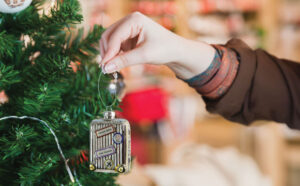Roasting coffee beans is an art. From first crack to the seconds beyond, roasters work to release the flavors and nuances of each variety of bean. They listen for that initial sound, similar to popcorn popping, and cue into the aroma, keeping a close watch on temperature and air flow. All to produce the roasts, from light to dark and in between, that coffee lovers have come to expect.
These small-batch roasteries deliver some of the freshest coffee available. They source their high-quality beans from farmers in Guatemala, Colombia and Indonesia, which have the perfect altitude, climate and sun to produce the best beans available. The beans are purchased in micro lots that arrive in 150-pound bags, not dump truck-sized lots like the big chain coffee shops.
These small craft businesses have popped up across the state, giving us the morning boost we crave and painting a bright future for local areas and beyond.
 Cold Blooded Coffee and Roastery
Cold Blooded Coffee and Roastery
Every morning, TJ Cowan of Carterville, an engineer by trade, found himself sitting in a drive-thru at his local coffee shop for his daily dose of caffeine. His curiosity got him thinking about what makes a cup of coffee good or bad; after trying cold brew, his questioning mind kicked into high gear. What is cold brew? Is it cold coffee? Why is it even a thing?
As it turns out, cold brew is a very different product. In April 2017, TJ started making it for himself and his wife Jackie. He became a student of the process, talked to friends who owned coffee shops, learned about the roast and how to make a balanced cup of coffee. He spent the next year and a half in the details.
“I gave away a lot of coffee to people who appreciate a good coffee bean and told them to be brutally honest.” It was never his plan to start a business, but as he served it to friends and word got out, he had a lot of requests for it. One day he realized he was spending a lot of time making it.
According to TJ, “I turned to my wife at one point and said, ‘This is a thing; I didn’t know this could be a thing!’”
Cold brewing takes time. It is brewed at ambient (room) temperature for about 18 hours. The process naturally pulls the sweetness out of the bean, resulting in a smooth coffee with no bitterness. “We have literally had probably 200 people tell us they’ve never been able to drink black coffee until they’ve had our cold brew.”
The heat used in brewing a traditional cup of coffee is what brings out the bitterness in it, which many, including TJ, mask with sugar or creamer. When drinking cold brew, TJ adds nothing to it.
TJ and Jackie started making cold brew, bottling it in amber growlers, like those in craft breweries, and asking for feedback. The typical response was that people were busy, they didn’t have time to sit in a drive-thru and just wanted to pour a cup and head out the door. TJ’s response was, “If that’s what you want, then we can have it waiting in your fridge when you get up.”
In the past year, the business has taken off, and now the Cowans find themselves trying to keep up with demand. Both work full-time jobs, and TJ finds himself working 40-60 hours in the evenings and on weekends.
“This was never supposed to be a business,” says TJ. “I’ve worked very hard to allow this to grow organically with no expectations. I didn’t set a goal to have a store or multiple stores or to franchise or to partner or to roast. It’s the need for this and the pull from customers that have literally created openings—I’ve just gone with the flow.”
Cold Blooded Coffee and Roastery recently partnered with Southern Illinois Mercantile in Marion to open a coffee counter, and a storefront in downtown Murphysboro is expected to open in the first quarter of 2020. The business sells wholesale cold brew and beans to local establishments like Larry’s House of Cakes in Carbondale and Marion, and Rule of Pie in Murphysboro. It also has franchises in Franklin, Spring Hill and Brentwood, Tenn.
As a full-fledged coffee shop, they now specialize not only in cold brew but espressos, cappuccinos, lattes, etc.
They microbrew the cold brew 20 gallons at a time, and the dark roast is their most popular. They have also developed 23 different flavors, some which change seasonally, including the popular bourbon pecan and maple bacon in the fall, and white chocolate caramel and peppermint mocha in the winter. The coffee is still black, sugar-free and organic, and its shelf life is three weeks without any loss in quality. Refills on growlers are $10 per half gallon.
TJ has a broker who helps him import beans from Colombia and Guatemala. He chooses beans grown in specific fields that have high scores judged on acidity, brightness and body.
Coffee drinkers tend to have a favorite roast. In the lighter to medium roasts, the taste of the bean comes out more. In the dark and espresso roasts, the taste of the roast is more prominent. It’s all a matter of preference. He says dark roasts are by far the favorite in southern Illinois.
With the opening of the counter in Marion, Jackie quit her job to manage the business and train employees. TJ handles the roasting and loves it. “We’ll see where this goes,” he says. “People ask me when I am going to do this [full time]. We’ll see. Every time we set a timetable, it’s happened much sooner than we expected. We are just rolling with the punches and trying to make a good cup of coffee.”
To find Cold Blooded coffee in your area, send an email to coldbloodedbrew@gmail.com.
 Galena Roasters
Galena Roasters
What started as a desire to help his wife Kimberly ended up becoming a passion for coffee roaster Earl Thompson of Galena Roasters.
“My wife, who owns The Grateful Gourmet, was having difficulties with her coffee vendor,” explains Earl. “On a whim, we went to a coffee trade show on St. Patrick’s Day in 2018. We signed up for seminars covering everything from roasting, roasters, green beans (unroasted coffee beans), etc. After the first day she was completely overwhelmed and wanted to quit. I said, ‘This is the coolest thing ever!’ Coffee roasting is basically a giant chemistry experiment with heat.”
Earl went to a 3-day Specialty Coffee Association (SCA) roasting school, bought a roaster and started learning on his own. He bought some cheap beans to experiment with so when he ruined a batch it wouldn’t “hurt so bad.” By June 2018, he had his first wholesale account.
He recommends the programs through SCA because you learn the entire process—from the origin of the beans, buying and evaluating them to importing and roasting. Part of the school was spent with an importer learning about green coffee; another day was all theory—the what, why and how. The third day was hands-on. He has gone to several coffee roaster retreats since.
“Specialty coffee is really a thing, like craft beer,” Earl says. “In order to be specialty coffee, it is scored like wine. The top and bottom scores aren’t that far apart. It’s all about finding that sweet spot.”
He continues to learn and experiment. “Every coffee that I get in here comes from a different origin [country], and they are all different. They are grown in different soil, sunlight, elevation, rain—all those things make a difference in the coffee.”
Earl then must figure out how to roast it to bring out the nuances in the bean and whether it would be better as a light roast or something darker. His signature blend is called The Grateful Blend, which is his most popular by far. It is a blend of medium light and medium dark roasts.
Earl sources his beans from Café Imports in Minneapolis. The business has offices in other countries and goes to farms to see what kind of coffee trees growers have and may ask that a certain part of the crop be set apart, reserved just for them. Consequently, those growers make more money for that coffee.
A single-man operation, Earl currently has 13 varieties of coffee. He says, “I could sit on this roaster all day and can only turn out so much coffee. … I’m at the point where I need a larger roaster. I’m excited. I knew that time would come. I have enough demand right now and feel I could create more but need a higher capacity roaster.”
He enjoys the roasting process. “It’s like when you’re a kid and you wonder what to be when you grow up. I’m 54 and I’ve found it. I seem to have a knack for it, and no one has ever told me that I roast a really awful coffee.”
Earl would like to expand the business and open or be a partner in a coffee shop to build brand awareness. “One thing I like is that while specialty coffee is in the big city, it is really only starting to have a presence in the Midwest,” he says. “If I stay on it, I have a good market position and just need to continue to grow.”
Grateful Roaster coffee beans can be found in Galena at The Grateful Gourmet and Galena Territory General Store. The business also provides single-brew pots for guest rooms at the Irish Cottage hotel. It can be purchased online at galenaroasters.com.
 Redbud Coffee Co.
Redbud Coffee Co.
While some may know it as a tree, the name Redbud Coffee Co. is a nod to its hometown of Auburn, also known as the Redbud City. It shows the company’s affection and commitment to their community.
Community and people are of utmost importance to the company, from the local people they interact with on a daily basis to those who farm the beans that end up in the Redbud roaster.
Konner Dudley, self-named Chief Roasting Officer of Redbud Coffee, says their motto is “People are more important than coffee.” It shows in the coffee they roast, the people they employ and their commitment to helping others.
Konner, an entrepreneurial spirit who is a graphic designer by day, was fascinated with the coffee roasting process. Through numerous online sources, and the gracious time of others more experienced, he learned the art.
Together with his co-owners and brothers Kurt and Kyle and father Mark, Konner has assembled a team of like-minded individuals. “My brother Kurt was the first one who believed in me,” says Konner. “He asked me what I thought it would take to get started, and I told him I needed some bags to package the coffee and sell it. He wrote a check to help me. My family bought in early and all of our wives are involved, along with other investors and a small team of roasters/baristas.”
Redbud sources most of its coffee from Café Imports in Minneapolis. “We wanted a company that wasn’t just on the commodity market, but one that cares about relationships with their growers,” Konner explains. “Café Imports does a really good job of maintaining real relationships with its farmers and paying them a good price.”
Their coffee beans come from farmers in Brazil, Ethiopia, Mexico, Costa Rica, Java and Colombia. Over the years they have roasted 10-15 different varieties, and Konner enjoys experimenting with new varieties. One that is always available is the Brazilian Honey with its sweet chocolate and caramel undertones. Konner says he would have unhappy customers if it was ever pulled from the offering list.
During warmer months, it’s hard to miss the red 30-foot Redbud Coffee truck often found on the north end of Auburn or at various locations in Springfield. There wasn’t a coffee truck in the Auburn area, and Konner saw it as an opportunity to be out in the community. And, it was much cheaper than a brick-and-mortar location.
The real challenge came when trying to fit everything into the truck—including a commercial coffee roaster, espresso machine, commercial grinder, office equipment and everything required to serve customers.
Once that challenge was resolved and the brand gained popularity, it didn’t take long for Konner to realize that he had to invest in a larger roaster.
“We currently roast on a 2-kilo roaster, which produces about 55 ounces of roasted beans. Most of the coffee we sell, especially wholesale, is in a 5-pound bag. We can’t even fill one bag with one output, and we are trying to fill orders of 6-8 bags at a time. We are moving up to a 12-kilo roaster, which will produce a little under 25 pounds at a time. We can’t put a roaster that size on the truck, so we purchased a property in downtown Auburn to do our roasting.”
Konner has assembled an enthusiastic group of employees. He encourages them to be creative and gives them the freedom to create and explore. One of the baristas came up with the popular blueberry maple coffee. Other creations include brown sugar sage and a recipe for their own pumpkin spice mix.
The company also donates $1 of every bag sold to the Aruna Project (arunaproject.com). The group goes into areas corrupt with human trafficking (sex trafficking in particular) and brings women out, then empowers and employs them.
“We try to make people aware of their cause and mission,” says Konner. “It’s really important work they are doing, and we want others to check them out and maybe find it in their hearts to help also.”
Redbud Coffee can be purchased at redbudcoffee.com and is hand-delivered for free in Sangamon County. Bags are available at Apple Barn in Chatham, and in Springfield at Hy-Vee, Bunn Gourmet and Wm. Van’s Coffee House. It is also served at Three Twigs Bakery in Springfield.
Help support these and other local coffee roasters by trying a cup, bag or bottle today.









